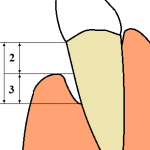
If you do not brush or floss properly, the bacteria in your mouth can grow and start forming a sticky layer called ‘plaque’ on your teeth. If you don’t brush and floss your teeth everyday, the plaque can soon turn into tartar. This hard formation, growing near the gum line, is difficult to remove by mere brushing or even with dental products. A dental visit is recommended to clean it out. If the tartar, which is a thriving area for bacteria, stays in your mouth for long, it can lead to gingivitis, which eventually results in periodontal disease.
Periodontitis is a set of inflammatory diseases affecting the periodontium, i.e., the tissues that surround and support the teeth. Periodontitis involves progressive loss of the alveolar bone around the teeth, and if left untreated, can lead to the loosening and subsequent loss of teeth.
Poor oral hygiene is among the main causes of periodontal disease. However, did you know that some of your everyday habits could slowly be eroding your dental health? Here are ten causes of periodontal disease that you should be mindful of:
1. Bad eating habits: Your teeth and gums are largely affected by what you eat and the kind of diet you follow. A diet that is rich in sugar or starch may relish your taste buds, but may have a negative impact on your dental health.
2. Hormonal changes: Gums become sensitive and prone to developing gingivitis or periodontal disease due to hormonal changes in the body during puberty, pregnancy and so on.
3. Teeth grinding: You may not realize it, but if you have the habit of grinding or clenching your teeth, you are likely to develop periodontitis. Teeth clenching or grinding can weaken your teeth overtime making them prone to conditions like periodontal disease.
4. Ill-fitting dental restorations: It is essential to get dental restorations like dentures from experienced cosmetic dentists to reduce your chances of getting dental fixtures that do not fit well. They can cause infection by leading to gum irritation.
5. Overall health condition: You are likely to develop periodontal disease if you suffer from poor nutrition, obesity, diabetes or AIDS.
6. Medication: Certain medications, especially those recommended for heart disease and depression can influence the saliva production in your mouth. Certain medicines can also cause gum tissue overgrowth, making it difficult to keep your gums clean.
7. Heredity: If there have been cases of periodontitis in your family, the chances are that the disease may affect you too. Regular dental visits coupled with good oral hygiene can reduce the risk though.
8. Stress: Stress from work, or relationships, can affect your immune system’s ability to fight infections, thereby leading to periodontitis.
9. Smoking or tobacco consumption: If you have the habit of smoking or chewing tobacco, you stand at a higher risk of developing periodontal disease, as the habit may affect the self-repairing ability of your gums.
10. AGE: Studies indicate that older people have the highest rates of periodontal disease. Data from the Centers for Disease Control and Prevention indicates that over 70% of Americans 65 and older have periodontitis.
The damage caused by periodontal disease can be reduced with regular deep cleanings and following oral health best practices. Schedule regular appointments with your cosmetic dentist to keep your mouth healthy and clean.
About Life-Like: Life-Like Cosmetic Solutions provides dental supplies for teeth whitening. Cosmetic dental practices use Life-Like’s professional whitening kits and teeth bleaching kits for at-home use. Visit the website at http://life-like.com to learn how cosmetic dentists can participate in the company’s “Marketing for Dentists” program at no cost. “Like” the Facebook page to receive regular tips on its teeth whitener products. Call 800-543-3545 for more information about increasing practice revenue through professional dental whitening.



